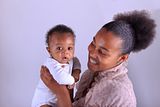What If the Face of the Anti-Vaxx Movement was a Black Woman?

by Altheria Gaston
The recent measles outbreak that is purported to have started at Disneyland in December 2014 and has affected at least 155 individuals has re-sparked an already heated controversy about the risks and benefits of vaccinations. Since the 1998 publication of a medical journal research paper linking the MMR vaccine to autism—a paper that was established to be fraudulent and was later retracted—there has been growing public interest in vaccinations. Perhaps the most recognizable face of the anti-vaxx movement is Jenny McCarthy, who once claimed that vaccinations cause autism but now proclaims that she is not an anti-vaxxer. But McCarthy is just one of many mothers on the forefront of the anti-vaccination movement.
More often than not, the face of the anti-vaccination movement is that of a privileged white woman. In a Chicago Magazine article, “Why Do Affluent, Well-Educated People Refuse Vaccines?”, author Whet Moser reveals that it’s mostly people with lots of information and financial resources that choose not to vaccinate. From Dr. Suzanne Humphries to Barbara Loe Fisher, the most vocal voices opposing vaccination are representative of a particular race and a particular class. These are mothers who boldly express skepticism and distrust of governmental agencies. They assert personal agency by refusing to vaccinate their children and, oftentimes, by taking to social media to levy the strength of collaboration formed as a result of singularity of purpose. In the case of Stephanie Messenger, who wrote Melanie’s Marvelous Measles, they minimize the dangers of communicable illnesses. They question. They challenge. They oppose. They resist.
As a result of their actions, the anti-vaxx movement continues to gain momentum. Although many in the medical community dismiss their claims as absurd, and the Center for Disease Control (CDC) are steadfast in their pro-vaccine stance, the claims of these middle class, suburban, white women have gained legitimacy. My goal is not to argue for or against vaccinations but to make a statement about why the voices of some identity groups are more respected and impactful than others.
Imagine how public sentiment about those who refuse to vaccinate their children might be different if voices of the anti-vaxx movement were Black mothers from low-income communities? I believe that if poor Black women from urban centers were at the forefront of opposing vaccinations, their claims would have been quickly dismissed, and their resistance would never have become a movement. Being judged as irresponsible and lazy, they and their findings would have been immediately dismissed. While school systems are granting exemptions to the children of those with enough social capital to petition that they be allowed to attend despite lacking “required” vaccinations, many parents comply with legal stipulations out of fear that their children will be barred from going to school. They vaccinate their children because they feel that they have to do so.
However, if a working-class Black mother made the decision to not vaccinate her child and send them to school, her decision would be more heavily policed by authorities and she would be judged more harshly. With a history of being characterized as pathological, Black motherhood is oftentimes scrutinized, and in case of the those who receive government benefits like welfare and food stamps, their mothering is regulated by government-determined stipulations.
In “Mama Tried: Narratives of Good Mothering in Rap Music,” Travis Gosa offers, “The popular mothering discourse has made it common sense that middle-class mothering styles are superior and necessary, while poor and Black mothers are portrayed as lazy, pathological, and even criminal." It is because of these depictions that I am convinced that some Black mothers are prohibited from exercising the same agency as white mothers. As a result, poor Black and Latino mothers are more likely to vaccinate than white, middle class mothers.
Ironically, we who have historical reasons to be skeptical of healthcare professionals are the ones most subject to negative portrayals if we don’t get our children vaccinated. Jason Johnson highlighted this contradiction in an NBC article, “Where Are the Black Anti-Vaxxers in the Measles Debate?”:
“These [anti-vaxxers], without a great deal of evidence, are convinced that the government and pharmaceutical companies are using us as guinea pigs for sick experiments. To my knowledge there isn't a long history in America of conducting science experiments on rich white people's kids, but there is a well-documented history of such experiments on African Americans.”
The argument between individual liberties and public good is at the heart of the vaccination controversy. Instead of debating about whether a mother should or should not vaccinate her children, I argue for racial and class equity. I stand on the side of those who believe that Black women’s voices deserve respect and validation and with those who work to remove the stigma from Black motherhood. And I salute Black women who are making informed decisions, whether they choose to vaccinate or not, about their children’s healthcare.
Photo: Shutterstock
Altheria Gaston is a doctoral candidate in the College of Education at Texas Christian University. She is a Black feminist who’s dissertation focuses on the realities of low-income Black women.

No comments: